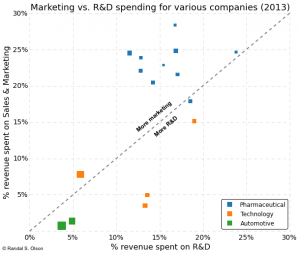
You know the dealer, the dealer is a man
With the love grass in his hand
Oh but the pusher is a monster
Good God, he’s not a natural manI said God damn, God, God damn The Pusher man
–Hoyt Axton, “The Pusher”
There is a drug called Daraprim. It is an anti-parasitic. It is used mostly to treat toxoplasmosis. That is a somewhat benign parasite you can get from eating under-cooked meat or handling cat feces. But if you have a compromised immune system, like an AIDS patient, a chemotherapy patient, or an infant, toxoplasmosis can kill you. Daraprim can also be used to treat malaria, which kills millions in developing countries.
Daraprim has been approved for medical use by our Food & Drug Administration (FDA) for 62 years. From 1953 to around 2010, a Daraprim pill cost about one dollar. Then GlaxoSmithKline, the pharmaceutical giant that owned Daraprim, sold its marketing rights in the United States to CorePharma in 2010. CorePharma immediately raised the price of a Daraprim pill to $13.50. CorePharma got bought out by Impax Labs, then Impax Labs sold Daraprim rights to Turing Pharmaceuticals.
Today, one pill of Daraprim sold by Turing costs $750.00.
Turing is owned by 32-year-old Martin Shkreli, a former hedge fund manager. He became ludicrously rich in his twenties by managing other people’s wealth. One of his wealth-building strategies, according to a 2012 complaint filed by Citizens for Responsibility and Ethics in Washington, was to publicly disparage the drugs being manufactured by companies that he was short-selling (betting on a company losing money). Shkreli even allegedly inserted himself into the FDA approval process to stop those drugs other companies would manufacture to help sick and dying people, so he could win his short-sell bets.
When CBS News asked Shkreli how he could defend such an excessive price increase that pushed the average cost of treatment from about $1,130 to $63,000, and for some patients over a half-million dollars annually, Shkreli said, “Because the drug was unprofitable at the former price, so any company selling it would be losing money. And at this price it’s a reasonable profit. Not excessive at all.”
Daraprim is by no means an isolated phenomenon; this is common in the pharmaceutical world where pills are just profits, not the lives of people, most of whom are financially struggling because of their medical condition. The New York Times, Bloomberg, and the Wall Street Journal have also listed some of the other recent examples of ghoulish price gouging by Big Pharma:
- Cycloserine (tuberculosis treatment) – Rodelis Therapeutics raises price from $500 for 30 pills to $10,800;
- Doxycycline (antibiotic) – raised from $20 a bottle to $1,849;
- Xyrem (narcolepsy) – 841 percent increase;
- Humulin (diabetes) – 354 percent increase;
- EpiPen (anti-anaphylactic) – 222 percent increase;
- Nitropress or Isuprel (heart medication) – bought by Valeant Pharmaceuticals, immediately raised price 525 percent and 212 percent;
- Ofirmev (pain) – raised from under $500 to $1,024 for 24 vials;
- Vimovo (pain) – raised from about $200 to $1,678 for 60 tablets.
When pressed on these price increases, CEOs will always moan about how unprofitable that drug is and how with their new profits, they’ll invest in better drugs. That’s Shkreli’s line, telling CBS, “With these new profits we can spend all of that upside on these patients who sorely need a new drug, in my opinion,” despite the fact medical professionals treating toxoplasmosis say the old $1 Daraprim pill was working just fine.

The problem with Shkreli’s spin is that pharmaceutical companies are spending far more money on marketing than they are on research and development. John Oliver had a great segment on that, where he showed how Johnson & Johnson spent $17.5 billion on sales and marketing in 2013, compared to $8.2 billion for research and development. Randall S. Olson did a great job illustrating how Big Pharma spends on marketing versus Big Tech and Big Auto spending more on R&D.
Martin Shkreli made $8.2 million in his last gig with Retrophin, Inc.; I can’t find any compensation info for his current gig with Turing, as it is a privately-held Swiss company. While talking with Bloomberg, he absolutely beamed with pleasure over what he thinks is a civil service he has performed. “We’re the first company that really focused on this product. And I think that’s a great thing, because ultimately companies before us were actually just giving it away, almost,” Shkreli complained. “The price that they were pricing it at, $13.50, you only needed less than 100 pills, so at the end of the day the price per course of treatment—to save your life!—was only $1,000.”
Yes, what a shame that we were only charging $1,000 – or roughly Shkreli’s dinner and bar tab – on saving an AIDS patient’s or a cancer patient’s or an infant’s life!
Shkreli is now feeling the heat on social media and traditional media. The Daily Beast called him “Big Pharma’s Biggest Asshole”. He’s been getting into beefs on Twitter, where he quotes Eminem to defend himself and claims the Daraprim price gouging is “a great thing for society.” Hillary Clinton has tweeted in response to the furor that “Price gouging like this in the specialty drug market is outrageous,” adding, “Tomorrow I’ll lay out a plan to take it on,” and the NASDAQ Biotech Index immediately plunged 126 points.
How are these drug companies any different than the pusher, taking advantage of a customer who can’t say no, jacking up the price as high as the market will bear? How is it 34 states have laws against price gouging in natural disasters, but none have laws against price gouging life-saving medicine?
Hoyt Axton was right – Martin Shkreli is a monster; good god, he’s not a natural man. He doesn’t think so, however, bragging recently on Twitter “I donated a total of $5,000,000 to various causes recently. Looking forward to telling you all about it.”
Meanwhile, my favorite herbal medication, while it won’t treat toxoplasmosis, has been dropping in price as our companies begin producing it legally.
Featured Image from @MartinShkreli






